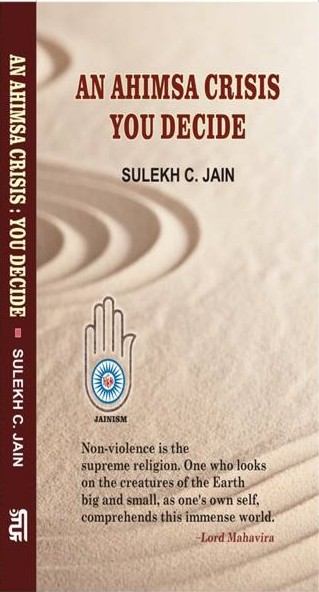In addition to water, Jains also enjoy many other drinks either for health, taste, and refreshment. These may include many fruit juices, thandai (made from almonds), lemon water, milk, and lassi and chhachh (both derivatives of milk). Except for the milk-based drinks for reasons stated earlier, other drinks are okay. However, Jains must use precautions to make sure that some of the ingredients, preservatives, and food coloring in beverages are not animal or insect based. There are quite a few drinks in the market that Jains should avoid.
The use of alcohol, wine, liquor, and other intoxicating drinks, as well as drinks and edible products based on honey, are prohibited in the Jain community but lately their use and consumption not only in gatherings and parties but also at home is significantly increasing. I am aware of many homes, celebrations, and marriages where alcoholic drinks are freely served.
Let us review the main qualities of a virtuous householder (known as the initial vratas).
Acharya Samantbhadra, in Ratnakaran shravkachar (verse 66), describes following eight qualities of a householder (non- monk or nun):
- Following the limited (anuvarat) vow of Non-violence.
- Following the limited (anuvarat) vow of Truth fullness.
- Following the limited (anuvarat) vow of Non-stealing.
- Following the limited (anuvarat) vow of Limited celibacy.
- Following the limited (anuvarat) vow of Limiting possessions/attachments.
- Not to consume any meat.
- Not to consume any alcohol.
- Not to consume any honey.
We will discuss item seven here, “Not to consume alcohol [or any mind altering substances like marijuana, cocaine, heroin or others].”
It is well known that alcohol and other mind-altering substances are bad for us. We will consider their ill effects in three categories:
a. Jain ethics.
b. Medical issues
c. Social issues.
Jain ethics:
Alcohol is a mind-altering drug; it is a depressant that alters mental faculties leading to decreased judgment power and memory. Jain Acharya in a book “pursharth-shiddhi-upaya” (verses 61 and 71) says that with altered mental faculty, one not only indulges in violence but will not be able to follow any of the vows of truthfulness, non-stealing, celibacy, or possessiveness and neither will one be able to control the passions of anger, deceit, greed, and hatred.
Under the influence of alcohol one indulges in emotions of ego, aggression, and lust. One also has trouble with his senses; this may include feeling numb, and experiencing blurred vision trouble with hearing and other fine motor skills.
Alcohol consumption is also one of the “seven addictive bad habits,” (Sapt-vyasan) described in Jain Scriptures; these include:
- Gambling
- Eating meat
- Drinking alcohol
- Hunting
- Prostitution/watching sexually explicit dances or movies
- Smoking
- Stealing
Is alcohol vegetarian?
It is well known that alcoholic beverages are made by process of fermentation; some are then filtered and preserved while others are distilled and bottled.
Jain scriptures do allow for some fermented products like yogurt to be consumed, but it is clearly defined that after forty-eight hours at room temperature, in fermented products two sensed or higher levels of life start to grow and therefore this process should be avoided.
The process of fermentation in the alcohol industry: Starter yeast culture: A small amount of grape juice, corn, or barley is mixed with yeast and in twenty-four hours, the starter is ready. The starter is then mixed with the remaining total quantity of grape juice, corn, or barley.
For ale, fermentation takes two weeks at 68 degrees Fahrenheit. For lager, fermentation takes six weeks at 48.2 degree Fahrenheit.
For wine, or fermentation of grape juice, the process takes four to six weeks, at room temperature or higher.
In wine-making a clarifying or refining agent is added to make wine clear by removing proteins from it. These clarifying or refining agents can include: egg whites, gelatin (from skin and connective tissue of pigs and cows), isinglass (from the bladders of sturgeon fish), casein (from milk), and benton clay. Some old Mediterranean countries use the blood of mammals for this purpose but blood is not used in either the US or France.
Organic (as mentioned above) clarifying or refining agents are used in most premium wines.
Medical issues involving consumption of alcohol:
Alcohol enters every cell it comes into contact with; alcohol dissolves in water and becomes part of the blood and each cell of the body except fat cells when consumed. With every drink of alcohol one loses 10,000 brain cells, leading to chronic memory loss and possibly Alzheimer’s disease.
Alcohol causes cirrhosis of liver, esophageal cancer, pancreatitis, malnutrition, accidents, suicides, and contributes to many other diseases.
Alcohol works on brain cells leading to decreases in mental faculty in the following ways:
It enhances GABA, an inhibitory neurotransmitter.
It weakens glutamine, an excitatory neurotransmitter.
The net result is sluggishness or decreased mental faculty and therefore alcohol is classified as central nervous system (brain) depressant.
Social reasons:
No one publicly acknowledges himself to be more than occasional or social drinker; no parents are happy or proud if their children consume alcohol, regardless of their age. Eight % of US population suffers from alcohol abuse and/or alcohol dependence. This number does not include so-called social drinkers (if one can always control the amount).
As we know the human brain is different from that of animals in that we have the power to think, analyze, and speak; alcohol alters all three. This is the basic cause of alcohol-related social problems including: domestic violence, aggressive behavior, anger, violence, sexual abuse and rape, broken friendships, broken families, ruined careers, and the phenomenon of binge drinking and its associated problems.
Is your booze vegan?
It might seem strange to consider, but your favorite drink might have more than just alcohol in it.
Brew-masters, winemakers, and distillers may include animal ingredients in their products directly, or they might use them in the processing and filtration.
When making the product, dairy, honey, and other things (including, in one case, a whole chicken dropped in the tank) are ingredients in the final recipe.
When filtering the drinks prior to bottling, companies can use things like isinglass (from fish bladders,) gelatin, egg whites, and seashells, among other things. These products grab onto the impurities and make it easier to catch them in the filters, though there are many animal-free alternatives in use.
These ingredients don’t usually show up on the label, so the only way to find out is to ask.
Now you decide: is this behavior consistent with ahimsa?
 Dr. Sulekh Chand Jain
Dr. Sulekh Chand Jain
